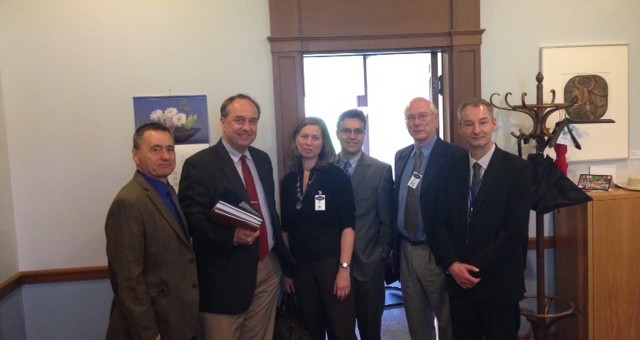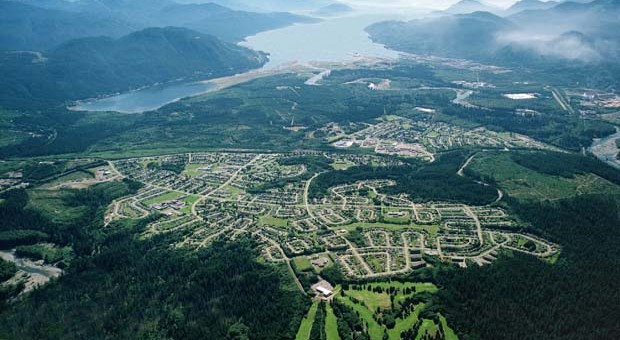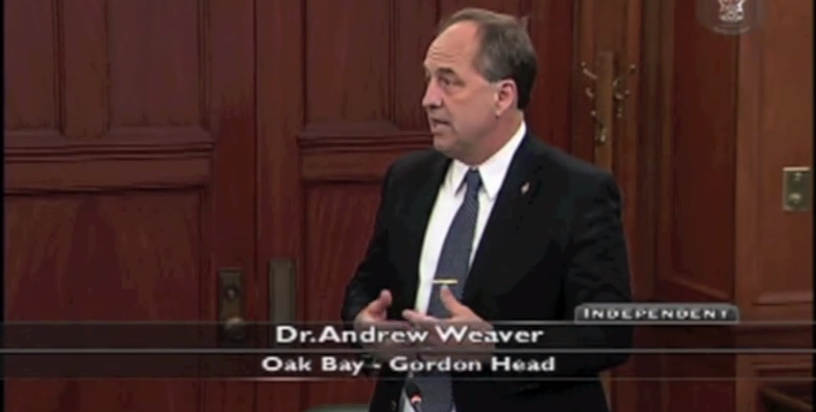Local Government
Petitions Call on Province to Review CRD Sewage Plan
Media Statement: May 5, 2014
Petition Calls on Province to Review CRD Sewage Plan
For Immediate Release
Victoria BC – Today Andrew Weaver presented three petitions to the House calling on the Provincial Government to pause and review the Capital Regional District proposal for secondary sewage treatment. The petitions totaling over 2600 signatures from residents throughout Greater Victoria were organized by The Prospect Lake Community Association and the Sewage Treatment Action Group.
In light of the rejection of re-zoning McLoughlin Point for a treatment plant by the Township of Esquimalt, following a series of public forums, and community concerns over the proposed plant at Hartland, the CRD plan appears to be on hold. The Minister of Environment has stated she has no intention of intervening on the Esquimalt re-zoning and has indicated the affected municipalities and regional district should come forward with a solution. She has also officially noted the deadline for completion is 2020 allowing time for alternative approaches to be discussed.
“These petitions, town halls, letters to editors and community actions clearly demonstrate that the residents and businesses in Greater Victoria are deeply concerned about the proposed project both in terms of its cost, as well as its appropriateness as a solution” said Andrew Weaver. “The region needs sewage treatment. And we know the province has promised to provide funding even with a 2020 deadline. What’s needed is a firm commitment of 1/3 federal funding so that the CRD will have full confidence that a review of the present plan is the right way to move forward”.
In submitting the petition to Andrew Weaver, Dr. Fred Haynes, Past President, Prospect lake Community Association noted: “ The newer technologies demonstrated at Dockside Green (Victoria), Ladysmith BC, Blaine Washington and Guadalajara Mexico show it is possible with this budget to invest taxpayers money in building a world leading system”.
Andrew Weaver will continue to work with community groups, regional mayors and councils, and community groups to encourage a sewage treatment plan that is affordable, meets current and future needs and is backed by the community.
Media Contact
Mat Wright – Press Secretary, Andrew Weaver MLA
mat.wright@leg.bc.ca
1 250 216 3382
Jumbo Glacier Resort: Undermined By Science
With a recent Supreme Court decision in place, the year-round ski resort on Jumbo Glacier is one step closer to development. If built, the resort will be the first of its kind in North America. It will also likely be the last of its kind, ever, because at a fundamental level, it simply does not make sense.
If fully completed, the 20-year, billion-dollar development is expected to be the only resort in North America where patrons will be able to ski year-round. The project has been hotly contested since its inception 23 years ago. Throughout this period, it has faced significant local opposition from special interest groups, local communities, and First Nations. Most recently the Ktunaxa First Nations brought the resort before the BC Supreme Court, arguing that its development violated a sacred area for the Ktunaxa Nation. The court has now ruled in favour of the developer, removing one more barrier to the resort’s construction.
But does this development make sense?
Development happens, change happens, and there will always be proponents and opponents of specific projects. Yet, in the case of the Jumbo Glacier Resort, there are a few facts that appear to undermine the viability of the project.
First, the science is clear: The whole concept of a long-term, all-season ski resort is slowly but surely becoming a fantasy. Glaciers across BC are melting and Jumbo Glacier is no exception. It is expected that by 2100, Jumbo Glacier will be largely non-existent. In fact, just looking at the period between 1985 and 2005, the entire Southeastern BC glacial region lost, on average, roughly 15% of its mass. Yet while the science is forecasting increased melting, according to the developer’s own plan it will still take over 20 years to build the proposed resort. This means that by the time the resort is fully operational a further 20 years of melting will have also occurred. The fact is, climate change is eliminating the viability of year-round glacial skiing and as it does so, it is turning Jumbo Resort into an increasingly risky investment.
Second, the Jumbo Resort clearly lacks a social license to continue. Over the last decade, media, governing bodies and special interest groups have conducted several polls and surveys that serve to highlight the significant local opposition to this project. For example, in the 2004 Environmental Assessment over 90% of the thousands of comments received were in opposition to the project. There has been significant local opposition to the idea of the resort from its inception and there continues to be strong opposition from the Ktunaxa First Nation.
Finally, the fact that the provincial government has used $250,000 to create a municipality that has no residents and no infrastructure is troublesome, given the real needs that exist in our province. How this is a good use of taxpayer money or a sound investment decision are both good questions.
Until this week, Jumbo Resort had a deadline to begin construction by this fall, or it would have to undergo a new environmental assessment. Unfortunately, the provincial cabinet passed an order in council this week that may exempt Jumbo Resort from undergoing this assessment. This change is particularly troublesome given the advancements in climate science and in our knowledge of glacier melting, both of which have evolved significantly since Jumbo underwent its last environmental assessment in 2004.
The fact is, the more we learn about glacier science, the less a resort like Jumbo makes sense. Given this, it’s hard to understand why the provincial government is subsidizing and promoting the development of a project that faces significant local opposition and flies in the face of our best scientific understanding of climatic trends.
Twenty years ago we may have thought this project had a promising future. Now we know that future is bleak.
Kitimat Vote a Clear Message Against Northern Gateway
Media Statement April 13th 2014
Kitimat Vote a Clear Message Against Northern Gateway
For Immediate Release
Victoria BC – Andrew Weaver welcomes the vote by the residents of Kitimat B.C.to reject the proposed Enbridge Northern Gateway pipeline project. We also congratulate the Mayor and Council of Kitimat for pursuing a democratic process allowing the people directly affected by the terminal to voice their opinion. The 58% against the project is a clear message, and we urge governments at all levels to respect the people of Kitimat, and the majority of people in British Columbia, who oppose this pipeline, and the increased tanker traffic.
“No means No, not a pathway to yes. I wish to congratulate the Mayor and Council of Kitimat for allowing the plebiscite, and the residents for clearly demonstrating their opposition to Northern Gateway. I also urge all levels of government, especially the Federal Cabinet, to respect the decision.” said Andrew Weaver – MLA, Oak Bay – Gordon Head
Coastal First Nations, and those along the pipeline route, are unanimous in their opposition to Northern Gateway. The B.C. government is opposed to the pipeline and terminal saying Enbridge has failed to address fundamental questions in their submission to the National Energy Board hearings. Provincial wide polls have consistently shown the majority of people in B.C. are against the project, and now the people of Kitimat have expressed their opposition.
“This is another nail in the coffin for Northern Gateway. The people of Kitimat should be congratulated by everyone throughout the province for their determined stance. They weighed the environmental risks to the small economic benefits and made the right choice” said Adam Olsen, interim leader of the B.C. Green Party
Media Contact:
Mat Wright – Press Secretary, Andrew Weaver MLA
(1) 250 216 3382
mat.wright@leg.bc.ca
Minister says “No Plan to Intervene” in Esquimalt Sewage Plant Re-Zoning
Media Statement: April 9th, 2014
Minister says “No Plan to Intervene” in Esquimalt Sewage Plant Re-Zoning
For Immediate Release
Victoria BC – In the House Tuesday Andrew Weaver asked the Minister of Environment, The Honourable Mary Polak, if the government had any intention of intervening over Esquimalt council’s unanimous rejection of the Capital Regional District plans for a sewage treatment plant at McLoughlin Point.
The reply from the Minister was – “We have no plans to intervene”
“The Minister has been consistent with her message regarding the CRD since I first raised this question in the House last year. She has no plans to intervene, and the program funding is available through to the completion deadline of 2020. “ said Andrew Weaver
Draft Transcript from Hansard, Tuesday April 8th, Afternoon Session, Committee A.
A Weaver: As the minister is aware, Esquimalt Council voted unanimously last night to reject the capital regional district rezoning request for McLoughlin Point for the sewage plant there. This comes, following considerable public engagement — four evenings of public consultation where only one person spoke in favour of the project, and many, many, many others spoke against it. The public consultation demonstrated there’s little, if any, support for the current plan.
My question is this: considering the CRD currently has no alternative site for the treatment plant and, in fact, Esquimalt have tasked staff with putting together information to rezone McLoughlin Point to not allow a sewage plant there, will the minister reassure residents of the region that the province will not intervene on the zoning unless the CRD proves all other options are exhausted?
Hon. M. Polak: I can assure the member that our position remains the same today as it has in the past. The federal government requires that they treat their sewage by 2020. This is an obligation that falls on the local governments. It’s unfortunate that they’ve reached this kind of an impasse.
I understand that CRD is meeting this week, perhaps even tomorrow, to discuss the implications. I’m not going to speculate on what might result from that, but we have no plans to intervene. We’ve said from the beginning that this is an issue that the local governments need to grapple with, understanding that they’re the ones who are obligated to begin treatment of their sewage. We have no plans to intervene
Media Contact
Mat Wright – Press Secretary, Andrew Weaver MLA
mat.wright@leg.bc.ca
1 250 216 3382
Bill 20 – Local Elections Campaign Financing Act
Yesterday I rose in the house to give my qualified support to Bill 20. While this bill is part of a two-step process to reform municipal elections financing, many, including me, wished that it had also brought in donation limits prior to the 2014 municipal elections. Just prior to me speaking, Linda Reimer, MLA for Port Moody-Coquitlam and Parliamentary Secretary to the Minister of Community, Sport and Cultural Development spoke. She noted:
All of the [Local Government Elections] task force recommendations are being implemented in this legislation, with the exception of those expense limits. They will be addressed in the second phase and implemented for the 2018 local elections. Expense limits set a maximum amount of money that candidates, elector organizations and third-party advertisers in local elections can spend on election campaigns.
The Local Government Elections Task Force recommended that expense limits be established in local government elections but didn’t recommend what the limits should be. We fully intend to put in place expense limits, but we felt it would not be appropriate to add expense limits to the mix of the significant reforms that we already have in place in an election year. UBCM supports this two-phased approach.
The first phase is the legislation that we introduced already. The legislation, as I said previously, represents the most significant reforms to local government in more than 20 years. And of course, the second phase will be our expense limits.
Below is the text of my speech. Please note that I believe it would be in everyone’s interest i government brought in financing limits this years fall sitting (if it is after the municipal election) or, at latest, spring 2015.
I rise to offer a few initial comments on Bill 20 with a wicked cold. I would much rather be in bed today, but I felt this was an important bill to speak to as we move to municipal elections this fall.
I recognize that the Local Elections Campaign Financing Act makes many needed changes in our local elections system. I was very happy to see that the legislation included further clarity around disclosure requirements and third-party advertising sponsorship. The added authority to Elections B.C. is also a welcome step in improving our democracy.
One noticeable absence in this bill, as alluded to by a number of previous speakers, is reform to the municipal spending limit for municipal elections. Now, I recognize the arguments put forward by the previous member with respect to the fact that the committee did not make recommendations on specific amounts, but the reality is that this is what people want. It’s been an ongoing issue for many years, and my main critique of this legislation before us today is that such spending limits are not included.
The government has had many opportunities since the Local Government Elections Task Force introduced its recommendations for improving local democracy in 2010, yet it still has not acted to limit campaign expenses.
Here’s a specific example. If we look at the numbers from Vancouver’s 2011 election, we see that Vancouver’s mainstream municipal parties collectively spent $5 million. That’s roughly $12 for every eligible voter. Now, compare that with Montreal, where candidates can spend 30 cents per voter, or Toronto, where candidates can spend 85 cents per voter. I think it’s pretty clear the difference — an order of magnitude difference.
It’s important that we take steps to limit the extent to which money can currently impact our municipal election results. Just as in the provincial system, in municipal elections people vote, not unions or business. It’s really time that we follow the lead that was set by our federal government in terms of putting campaign limits and also banning the donations from union and business interests — vested interests, I might add.
Because whose interests are ultimately served? Is it the voter, or is it the person with the biggest paycheque? Sometimes it seems to me that it’s the person with the biggest paycheque, and if that biggest paycheque is unbounded, the person with the biggest paycheque is the wealthiest person.
It’s particularly important in the context of this newly proposed four-year municipal election cycle. Some have argued that extending the term lengths for elected officials without introducing spending limits further tilts the balance of power in favour of those who can spend the most. While there certainly are merits for elected officials having a longer term in office — I support that — it’s perhaps unfortunate that this proposed extension comes at a time when one of the largest issues facing local government elections is campaign spending.
Of course, I want to recognize that it would have been impractical and even somewhat unfair to introduce legislation that would change campaign spending protocol during an election year, but I come back to the fact that the government has had quite some time to actually develop this legislation.
That being said, the people of British Columbia need some certainty that this government intends to follow through with its promise and cap election spending before the next local election. To that effect, I am pleased to hear the speech by the previous member. The previous member spoke to the fact that this would, in fact, be the case.
The government has had a number of years since the task force recommendation. It’s time to act expediently to bring these changes forward. I look forward to hearing from the government regarding the timeline for bringing in these reforms and will withhold further comments until the committee stage.








